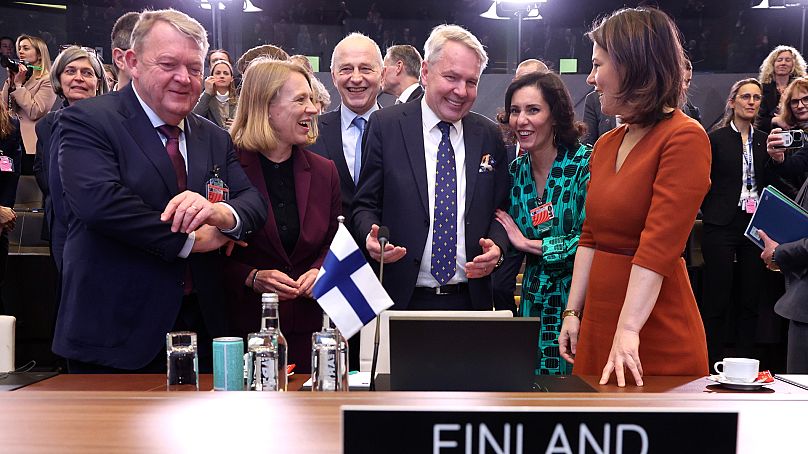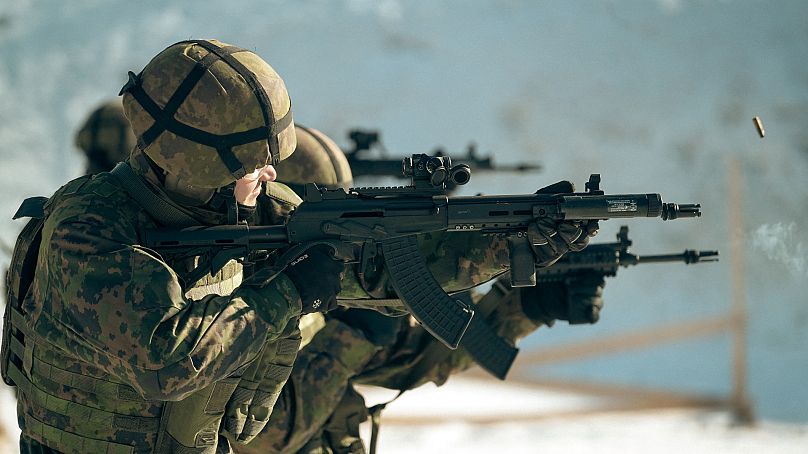Finland has joined NATO. But what does that actually mean? And are there risks that come with NATO membership? Euronews asked the experts to find out.
Finland's flag is flying over NATO’s headquarters after it became the 31st member of the military alliance on Tuesday, despite threats from Moscow, as Helsinki's quick accession process doubled Russia's land borders with the group.
 ADVERTISEMENT
ADVERTISEMENT
 ADVERTISEMENT
ADVERTISEMENT
But what are the benefits, obligations and possible threats that the Nordic country could face from Vladimir Putin's government following its accession?
Euronews spoke with Fabrice Pothier, a senior consulting fellow at the International Institute of Strategic Studies and former NATO chief policy, and Henri Vanhanen, a researcher at the Finnish Institute of International Affairs, to find out.
What does Finland gain strategically from joining NATO?
Fabrice Pothier: “It's a mutual gain. For Finland, it is clearly to be part of a broader defensive alliance. But NATO is also gaining because first, with Finland, then soon Sweden, it's closing a kind of gap that NATO has been dealing with for the past few decades in the Baltic region. In the past, any type of contingency planning - when the military planners have to consider all sorts of crises scenario- [NATO] could not count on Finland and Sweden to automatically join in a response to a possible military incursion.”
Finland's accession into NATO will create a kind of "retaining wall" around Russia, starting in northern Europe with Finland and reaching eastward, where NATO reinforced its military presence on its eastern flank after the outbreak of war in Ukraine - first with Estonia, Latvia, Lithuania and Poland, and then with new combat groups in Romania, Bulgaria, Slovakia and Hungary.
However, Finland will not host NATO troops for the time being. And Finnish Defence Minister Antti Kaikkonen said Tuesday that his country has not yet decided whether to ask for the deployment of troops onto its territory. NATO chief Jens Stoltenberg, for his part, said that the alliance will wait for Finland's consent to deploy troops.
What rights does Helsinki have within the alliance?
Fabrice Pothier: “NATO is fundamentally an alliance of sovereign nations, and each makes their own sovereign decision as to whether they want to have other NATO forces or capabilities on their ground or not. And it's not automatic on both sides of NATO. Other NATO nations cannot expect automatically to deploy whatever they think they should deploy on Finnish territory. And Finland will not have to automatically join any NATO operation just because it's a member of the Alliance.”
Henri Vanhanen:"The President [Sauli Niinistö] has said that Finland will not set any limits or preconditions to its NATO membership, meaning that Finland actually doesn't have any limits to potential NATO presence on Finnish soil. It will be more about how Finland will contribute to alliance tasks during peacetime, for example, participating in air policing of the Baltic states.”
According to Kremlin spokesperson Dmitry Peskov, Russia will take steps to rebalance its security system following Finland's accession.
What response can we expect from Russia?
Fabrice Pothier: "Russia takes Article 5 seriously. So, we have to assume that now that Finland is under the article, the Russians might play the usual blackmail-threatening game. But it is not clear how far they would be willing to go."
Henri Vanhanen:"Fear is not what drove Finland to join NATO or seek the application to become a NATO member. I think it was the idea of trying to balance Russia's aggressive behaviour and also bring stability to northern Europe. Finland has learned to be prepared, but not scared."












